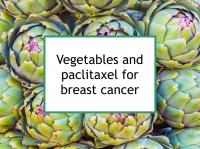The current webpage is designed to make additional research available concerning how certain vegetables or their major bioactive components can act as paclitaxel sensitizers or protect against its adverse side effects. At the bottom of this webpage are links to studies relating to the beneficial vegetables listed in Foods to eat and avoid during paclitaxel.
Vegetable consumption heightens the cytotoxic effects of paclitaxel in breast cancer cells or protects from its harmful side effects mainly through the actions of various phytonutrients, among them:
- Apigenin (found, for example, in bok choy, celery, garlic)
- Beta-carotene (butternut squash, carrots, pumpkins)
- Capsaicin (hot peppers)
- Cucurbitacins (cucumbers, pumpkins, zucchini)
- Diallyl trisulfide (garlic)
- Ferulic acid (artichokes)
- Fisetin (onions, especially red or white)
- I3C/DIM (Brussels sprouts, broccoli & broccoli sprouts, watercress & garden cress)
- Isothiocyanates such as AITC & PEITC (found in cruciferous vegetables such as arugula, cauliflower, and radishes)
- Kaempferol (chives, leeks, mustard greens)
- Lutein (collard greens, romaine lettuce, turnip greens)
- Luteolin (celery, hot peppers, radicchio)
- Lycopene (red or orange bell peppers, tomatoes)
- Quercetin (hot peppers, onions, romaine lettuce)
- Rutin (black olives, tomatoes)
- Sulforaphane (cabbage, kale, radishes)
- Vitamin C (baby zucchini, bell peppers, hot peppers)
Please read the applicable food webpages when making your own food lists since these pages contain important advice, food rankings (e.g., highly recommended, recommended in moderation), consumption limits, and other pertinent information.
Vegetable phytochemicals should be obtained by eating vegetables rather than taking supplements. Some beneficial compounds have been shown to have a U-shaped dose-response curve in cell or animal studies. In other words, a deficiency in the compound appears to promote breast cancer, but so does a relatively high dose. However, the sweet spot of maximum benefit at the bottom of the curve is not established for human beings. In any case, when a beneficial micronutrient is administered at low doses by consuming food, it is likely to have subtle chemopreventive effects, whereas the same compound administered at high doses is more likely to have pharmacological effects, with possible unwanted outcomes.
